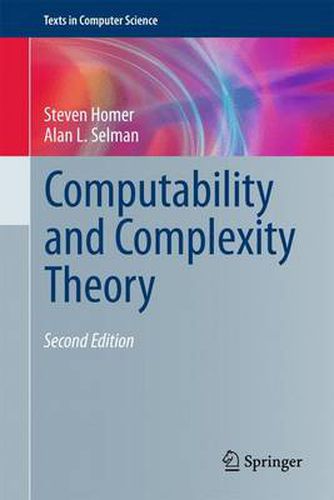Readings Newsletter
Become a Readings Member to make your shopping experience even easier.
Sign in or sign up for free!
You’re not far away from qualifying for FREE standard shipping within Australia
You’ve qualified for FREE standard shipping within Australia
The cart is loading…






This title is printed to order. This book may have been self-published. If so, we cannot guarantee the quality of the content. In the main most books will have gone through the editing process however some may not. We therefore suggest that you be aware of this before ordering this book. If in doubt check either the author or publisher’s details as we are unable to accept any returns unless they are faulty. Please contact us if you have any questions.
This revised and extensively expanded edition of Computability and Complexity Theory comprises essential materials that are core knowledge in the theory of computation. The book is self-contained, with a preliminary chapter describing key mathematical concepts and notations. Subsequent chapters move from the qualitative aspects of classical computability theory to the quantitative aspects of complexity theory. Dedicated chapters on undecidability, NP-completeness, and relative computability focus on the limitations of computability and the distinctions between feasible and intractable. Substantial new content in this edition includes:
a chapter on nonuniformity studying Boolean circuits, advice classes and the important result of Karp Lipton. a chapter studying properties of the fundamental probabilistic complexity classes a study of the alternating Turing machine and uniform circuit classes.
an introduction of counting classes, proving the famous results of Valiant and Vazirani and of Toda a thorough treatment of the proof that IP is identical to PSPACE
With its accessibility and well-devised organization, this text/reference is an excellent resource and guide for those looking to develop a solid grounding in the theory of computing. Beginning graduates, advanced undergraduates, and professionals involved in theoretical computer science, complexity theory, and computability will find the book an essential and practical learning tool.
Topics and features:
Concise, focused materials cover the most fundamental concepts and results in the field of modern complexity theory, including the theory of NP-completeness, NP-hardness, the polynomial hierarchy, and complete problems for other complexity classes
Contains information that otherwise exists only in research literature and presents it in a unified, simplified manner Provides key mathematical background information, including sections on logic and number theory and algebra
Supported by numerous exercises and supplementary problems for reinforcement and self-study purposes
$9.00 standard shipping within Australia
FREE standard shipping within Australia for orders over $100.00
Express & International shipping calculated at checkout
This title is printed to order. This book may have been self-published. If so, we cannot guarantee the quality of the content. In the main most books will have gone through the editing process however some may not. We therefore suggest that you be aware of this before ordering this book. If in doubt check either the author or publisher’s details as we are unable to accept any returns unless they are faulty. Please contact us if you have any questions.
This revised and extensively expanded edition of Computability and Complexity Theory comprises essential materials that are core knowledge in the theory of computation. The book is self-contained, with a preliminary chapter describing key mathematical concepts and notations. Subsequent chapters move from the qualitative aspects of classical computability theory to the quantitative aspects of complexity theory. Dedicated chapters on undecidability, NP-completeness, and relative computability focus on the limitations of computability and the distinctions between feasible and intractable. Substantial new content in this edition includes:
a chapter on nonuniformity studying Boolean circuits, advice classes and the important result of Karp Lipton. a chapter studying properties of the fundamental probabilistic complexity classes a study of the alternating Turing machine and uniform circuit classes.
an introduction of counting classes, proving the famous results of Valiant and Vazirani and of Toda a thorough treatment of the proof that IP is identical to PSPACE
With its accessibility and well-devised organization, this text/reference is an excellent resource and guide for those looking to develop a solid grounding in the theory of computing. Beginning graduates, advanced undergraduates, and professionals involved in theoretical computer science, complexity theory, and computability will find the book an essential and practical learning tool.
Topics and features:
Concise, focused materials cover the most fundamental concepts and results in the field of modern complexity theory, including the theory of NP-completeness, NP-hardness, the polynomial hierarchy, and complete problems for other complexity classes
Contains information that otherwise exists only in research literature and presents it in a unified, simplified manner Provides key mathematical background information, including sections on logic and number theory and algebra
Supported by numerous exercises and supplementary problems for reinforcement and self-study purposes